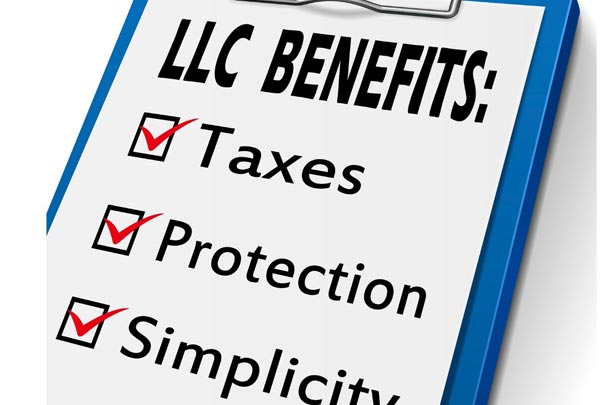The differences between Limited Liability Companies/Limited Partnerships and corporations
The biggest differences concerning limited liability companies/limited partnerships and corporations are that creditors can get at assets held by corporations much more easily than assets held by a limited liability company or a limited partnership.
With limited liability companies and limited partnerships, the best creditors can hope to get is an economic interest, which means they can get a right to receive the owner’s profits but have no say in the management of the entity. For this reason, creditors tend to be put off with having to go after ownership interests in a limited liability company or a limited partnership.
The operating agreement or partnership agreement should contain a provision stating that ownership interests cannot be sold nor the entity dissolved without the other owner’s permission.
In some states creditors cannot get at a limited liability company’s membership interests at al. This is based upon the theory that it would unfairly harm the other members. This list of states includes Arkansas, Illinois, Nevada, Connecticut, Louisiana, Oklahoma, Delaware, Maryland, Rhode Island, Idaho, Minnesota, Virginia. This works well if you reside in one of these states and your assets are located in them as well.
The problem with other states is that they are unlikely to honor this approach because they fail to recognize it for their own limited liability companies. This means this kind of shielding only works if the litigation is brought in one of those states which allow the shielding.

Limited Liability Company
-
LLC shareholder or member
-
Why do we need LLC’s?
-
The businesses that benefit from LLCs
-
The basics of Limited Liability Companies (LLCs)
-
Articles of Organization for Limited Liability Companies
-
The advantages of Limited Liability Companies (LLCs)
- The differences between Limited Liability Companies/Limited Partnerships and Corporations
- LLC’s Part One – History
- LLC’s Part Two – Formation, Structure and Operating Agreement
- LLC’s Part Three – Membership Interests and Member Contributions
- LLC’s Part Four – Liability
- LLC’s Part Five – Records, Books and Taxation
- LLC’s Part Six – Centralized Management and Transferability of Interests
- LLC’s Part Seven – Continuity of Life, Withdrawal of Members and Dissolution
- Delaware Series Limited Liability Company
- Kentucky closes loopholes in limited liability companies
- Frequently asked questions about Limited Liability Companies (LLCs) – Part One
- Frequently asked questions about Limited Liability Companies (LLCs) – Part Two
- Frequently asked questions about Limited Liability Companies (LLCs) – Part Three
- Advantages of a Limited Liability Company
- Advantages of a Limited Liability Company (LLC) over a Limited Partnership
- Advantages of a Limited Liability Company (LLC) over an S Corporation
- Facts about Limited Liability Companies (LLCs)
- More frequently asked questions about Limited Liability Companies – Part One
- More frequently asked questions about Limited Liability Companies – Part Two
- More frequently asked questions about Limited Liability Companies – Part Three
- More frequently asked questions about Limited Liability Companies – Part Four
- More frequently asked questions about Limited Liability Companies – Part Five
-
LLC shareholder or member
-
Why do we need LLC’s?
-
The businesses that benefit from LLCs
-
The basics of Limited Liability Companies (LLCs)
-
Articles of Organization for Limited Liability Companies
-
The advantages of Limited Liability Companies (LLCs)
- The differences between Limited Liability Companies/Limited Partnerships and Corporations
- LLC’s Part One – History
- LLC’s Part Two – Formation, Structure and Operating Agreement
- LLC’s Part Three – Membership Interests and Member Contributions
- LLC’s Part Four – Liability
- LLC’s Part Five – Records, Books and Taxation
- LLC’s Part Six – Centralized Management and Transferability of Interests
- LLC’s Part Seven – Continuity of Life, Withdrawal of Members and Dissolution
- Delaware Series Limited Liability Company
- Kentucky closes loopholes in limited liability companies
- Frequently asked questions about Limited Liability Companies (LLCs) – Part One
- Frequently asked questions about Limited Liability Companies (LLCs) – Part Two
- Frequently asked questions about Limited Liability Companies (LLCs) – Part Three
- Advantages of a Limited Liability Company
- Advantages of a Limited Liability Company (LLC) over a Limited Partnership
- Advantages of a Limited Liability Company (LLC) over an S Corporation
- Facts about Limited Liability Companies (LLCs)
- More frequently asked questions about Limited Liability Companies – Part One
- More frequently asked questions about Limited Liability Companies – Part Two
- More frequently asked questions about Limited Liability Companies – Part Three
- More frequently asked questions about Limited Liability Companies – Part Four
- More frequently asked questions about Limited Liability Companies – Part Five
newsletter signup
[forminator_form id=”1485″]

FIGHTING BACK!
